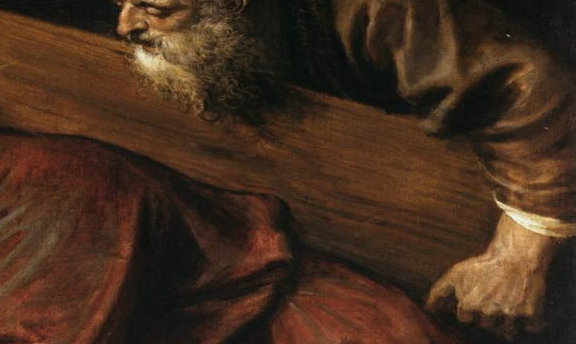“And he bearing his cross went forth into a place called the place of a skull, which is called in the Hebrew Golgotha,” (John 19:17).
The scene that played out on the dirt path leading from the governor’s palace to the hill of Golgotha this particular day was at once the most significant and the most tragic ever observed there. Because of the incessant beatings and scourgings Christ had suffered during the last fifteen hours, it was a miracle to those onlookers that he could even walk on his own, much less carry his cross.
His back was in shreds. The rest of his body, what wasn’t covered in both fresh and dried blood, was black and blue from the unrelenting blows he’d suffered. His was an image too painful for human eyes, as Isaiah prophesied hundreds of years earlier: “He is despised and rejected of men; a man of sorrows and acquainted with grief, and we hid as it were our faces from him,” (Isa. 53:3).
With his strength most nearly gone, he had to bear not only the weight of the cross itself but the immeasurable weight of the sins of all mankind which it represented. So it’s not surprising that, with scarcely enough life left in him to continue each breath, he faints under its weight and sinks to the ground.
The gospels of Matthew, Mark, and Luke all give an account of what happens next (Matt. 27:32, Mark 15:21, Luke 23:26). A man named Simon of Cyrene was on his way back from the country. Whether he got caught up in the event out of curiosity or just found himself delayed with the foot traffic of the crowd, Simon ends up a bystander watching Jesus make his way to Golgotha. And whether he felt sympathy for the Lord’s plight or not, we don’t know. We do know, however, that Roman soldiers seized him and forced him to help Jesus carry his cross the rest of the way up Golgotha’s hill.
How truly do the people in charge here once again strain at a gnat while swallowing the camel? The cross was considered a heathen (i.e., Roman) death, and so it was listed among the Jews’ many abominations. For this reason, they could not even think of touching this tree of infamy. And yet, they thought nothing of touching the Lord’s anointed, of crucifying the Lord of glory (Ps. 105:15, Heb. 6:6). So Simon, a Gentile, is chosen to carry the Lord’s cross for him.
And herein we have the last representation of the Jews’ rejection of both the burden and the blessing of the cross. Repeating history (Gen. 27, 48:14), God’s chosen nation relinquishes the birthright to this kingdom and the blessing of this cross to the Gentile. And yet Christ does not share the burden of his cross with this Gentile until the Jews had first thrown him out of their synagogue (Mark 15), and now out of their city.
Simon the Cyrene is a literal image of Christ’s invitation to his people in Matthew 16:24, “If any man will come after me, let him deny himself, and take up his cross, and follow me.” The cross is an instrument of death – a painful, humiliating death. And yet Christ was willing to endure death on that cross for me. The question now is whether or not my level of commitment and obedience to him is as deep and as strong as his was for me. Am I equally willing to endure whatever obedience requires of me? Am I willing to die to self and follow him?
Jesus spoke of this same truth in Luke 9:24, “For whosoever will save his life shall lose it: but whosoever will lose his life for my sake, the same shall save it.” Nothing in this earthly life is worth trading a life of rapturous glory with Christ for all eternity for. But to gain the crown of life in glory requires that I walk that road and bear that cross after him now.
Contemplations:
- O my blessed Savior, your cross bore nothing but the thorns of shame, torture, and death for you, and yet how plentifully did it bear the grapes of gladness, the olives of peace, the laurel of triumph for me? To me, it is like the ark of Noah that rescues me from the flood waters of death (Gen. 6). It is like the rod of Moses that delivers me from Egypt’s bitter bondage (Exod. 4). It is Jacob’s ladder that ties earth and heaven together and makes them transmutable. It is my shield of truth that Joshua lifted up against spiritual wickedness. And it is the wood of Isaac, which he carried on his shoulders for a self-sacrifice, required by the Father.
- Lord, may I never be ashamed of the cross you carried for me, though it was thoroughly weighted with the shame of sin when you bore it on that long road to Calvary. And as difficult as it is, may I not hide my face from the pain and humiliation of your passion and death, for I know this is the path of life in the end.
- O Lord, may I never consider being named among your disciples unless I am fully willing and ready to take up your cross and follow you (Matt. 16:24). Let me, with Simon, never stop following in your steps until I come to my own Golgotha, my own grave. For afterward, then, you will receive me into glory.
Further References for John 19:17:
Luke 14:27, 23:33; Matt. 27:31, 33.


